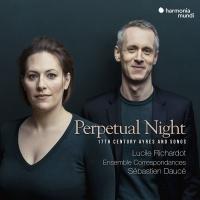Perpetual night
Auteur(s) Richardot, Lucile (721) (A); Webb, William (230) (comp.); Daucé, Sébastien (545) (org. & dir.); Johnson, Robert (1583-1633) (230) (comp.); Lawes, William (1602-1645) (230) (comp.); Coprario, John (1570-1626) (230) (comp.); Ramsey, Robert (230) (comp.); Jackson, John (230) (comp.); Banister, John (230) (comp.); Hart, James (1647-1718) (230) (comp.); Blow, John (1649-1708) (230) (comp.); Locke, Matthew (1621-1677) (230) (comp.); Lanier, Nicholas (1588-1666) (230) (comp.); Jenkins, John (1592-1678) (230) (comp.); Purcell, Henry (1659-1695) (230) (comp.); Ensemble Correspondances (545) (ens. voc. & instr.); Hilton, John (1599-1657) (230) (comp.)
Titre(s) Perpetual night : 17th century ayres and songs / Lucile Richardot.
Editeur(s) Harmonia Mundi Musique, 2018.
Contient Care-charming sleep. - Whiles I this standing lake. - Go, happy man. - What tears, dear Prince, can serve. - Music, the master of thy art is dead. - No more shall meads. - Go, perjured man. - Pavan in F. - Give me my lute. - Howl not, you ghosts and furies. - Britanocles the great and good appears. - Powerful Morpheus, let thy charms. - Rise, princely sheperd. - Adieu to the pleasures. - Amintas, that true hearted swain. - Poor Celadon, he sighs in vain (Loving above himself). - Saraband. - When Orpheus sang. - Phillis, oh ! Turn that face. - Epilogue : Sing, sing, ye muses. - Care-charming sleep. - Whiles I this standing lake. - Go, happy man. - What tears, dear Prince, can serve. - Music, the master of thy art is dead. - No more shall meads. - Go, perjured man. - Pavan in F. - Give me my lute. - Howl not, you ghosts and furies. - Britanocles the great and good appears. - Powerful Morpheus, let thy charms. - Rise, princely sheperd. - Adieu to the pleasures. - Amintas, that true hearted swain. - Poor Celadon, he sighs in vain (Loving above himself). - Saraband. - When Orpheus sang. - Phillis, oh ! Turn that face. - Epilogue : Sing, sing, ye muses.
Résumé La circulation des artistes comme des souverains entre la France et l'Angleterre au XVIIe siècle a permis d'affirmer outre-Manche des genres extrêmement originaux : premiers récitatifs, grands airs de Mask, "scènes" dramatiques constituent un riche terrain d'expérimentations préparant la naissance du semi-opéra... Sébastien Daucé propose d'explorer cet art vocal anglais en offrant un programme taillé sur mesure à l'une des voix les plus fascinantes d'aujourd'hui : Lucile Richardot, au coeur de l'écrin de l'ensemble Correspondances, lie avec subtilité musique, amour, nuit et mélancolie.
Notes Classique. - Textes des chansons. - Télérama No.3572 p.58 du 27/06/2018. 4/4. - Diapason No.669 p.118 du 16/07/2018. 6/6. - Classica No.204 p.92 du 24/07/2018. 5/5.
Indice(s) 3.0606
Courriel https://www.gamannecy.com/upload/albums/201803/3149020226926_thumb.jpg
Titre(s) Perpetual night : 17th century ayres and songs / Lucile Richardot.
Editeur(s) Harmonia Mundi Musique, 2018.
Contient Care-charming sleep. - Whiles I this standing lake. - Go, happy man. - What tears, dear Prince, can serve. - Music, the master of thy art is dead. - No more shall meads. - Go, perjured man. - Pavan in F. - Give me my lute. - Howl not, you ghosts and furies. - Britanocles the great and good appears. - Powerful Morpheus, let thy charms. - Rise, princely sheperd. - Adieu to the pleasures. - Amintas, that true hearted swain. - Poor Celadon, he sighs in vain (Loving above himself). - Saraband. - When Orpheus sang. - Phillis, oh ! Turn that face. - Epilogue : Sing, sing, ye muses. - Care-charming sleep. - Whiles I this standing lake. - Go, happy man. - What tears, dear Prince, can serve. - Music, the master of thy art is dead. - No more shall meads. - Go, perjured man. - Pavan in F. - Give me my lute. - Howl not, you ghosts and furies. - Britanocles the great and good appears. - Powerful Morpheus, let thy charms. - Rise, princely sheperd. - Adieu to the pleasures. - Amintas, that true hearted swain. - Poor Celadon, he sighs in vain (Loving above himself). - Saraband. - When Orpheus sang. - Phillis, oh ! Turn that face. - Epilogue : Sing, sing, ye muses.
Résumé La circulation des artistes comme des souverains entre la France et l'Angleterre au XVIIe siècle a permis d'affirmer outre-Manche des genres extrêmement originaux : premiers récitatifs, grands airs de Mask, "scènes" dramatiques constituent un riche terrain d'expérimentations préparant la naissance du semi-opéra... Sébastien Daucé propose d'explorer cet art vocal anglais en offrant un programme taillé sur mesure à l'une des voix les plus fascinantes d'aujourd'hui : Lucile Richardot, au coeur de l'écrin de l'ensemble Correspondances, lie avec subtilité musique, amour, nuit et mélancolie.
Notes Classique. - Textes des chansons. - Télérama No.3572 p.58 du 27/06/2018. 4/4. - Diapason No.669 p.118 du 16/07/2018. 6/6. - Classica No.204 p.92 du 24/07/2018. 5/5.
Indice(s) 3.0606
Courriel https://www.gamannecy.com/upload/albums/201803/3149020226926_thumb.jpg
Exemplaires
| Titre | Réserver | Support | Code-barres | Cote | Section | Localisation | Situation |
|---|---|---|---|---|---|---|---|
| Perpetual night | CD audio | 03318000044514 | 3.0 RIC | Multimédia | CD | Disponible |
